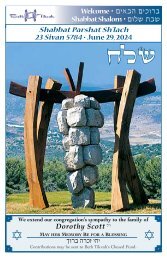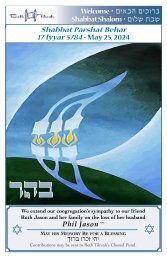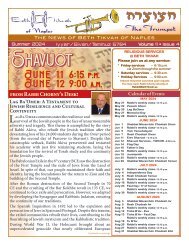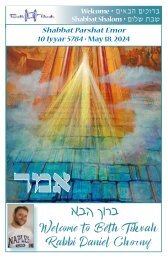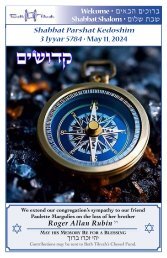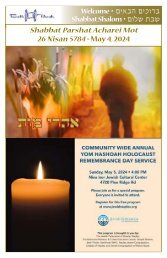You also want an ePaper? Increase the reach of your titles
YUMPU automatically turns print PDFs into web optimized ePapers that Google loves.
Welcome • ohtcv ohfurc<br />
Shabbat Shalom • ouka ,ca<br />
Shabbat Parshat <strong>Vayetze</strong>i<br />
9 Kislev 5783 • December 3, 2022<br />
Join us for a fun-filled evening<br />
in company of your<br />
Beth Tikvah family<br />
COST PER PERSON $18<br />
CHILDREN 14 & UNDER - FREE<br />
aoyv<br />
HANUKKAH<br />
CELEBRATION<br />
SUNDAY DECEMBER 18 7:00 P.M.<br />
FUN ACTIVITIES<br />
TRADITIONAL FOOD<br />
LIVE MUSIC<br />
Join Rabbi Chorny<br />
for his weekly discussion<br />
group, Tuesdays at<br />
12:15 p.m. via<br />
Sponsor a<br />
Kiddush<br />
Contact: Linda Scheinberg: 239-513.1950<br />
or missus205@gmail.com
Yahrtzeiten<br />
Dec 3 • Kislev 9 Harry Baker – Father of Susie Goldsmith<br />
Dec 4 • Kislev 10 Harry Blumberg – Father of Albert Blumberg<br />
John E. Brown – Father of Donna Rosenberg<br />
Lewis Whitman – Husband of Sylvia Whitman<br />
Minnie Nemeroff – Mother of Judith Adelman<br />
Dec 6 • Kislev 12 Mattaniah Eytan – Brother of Ruth Jason<br />
Dec 8 • Kislev 14 M. L. Spiegel – Father of Richard Spiegel<br />
Dec 9 • Kislev 15 Hazel McKenzie – Mother of Susie Goldsmith<br />
Birthdays<br />
Dec 4 Stephen Meltz Dec 7 Ralph Stein<br />
Dec 9 Phyllis Garon<br />
Kiddush Sponsor<br />
Albert & Beth Blumberg<br />
In loving memory of Albert’s father,<br />
Harry Blumberg<br />
MAVENS: Judy Fant, Linda Schceiberg<br />
HELPERS: Rosalee Bogo, Sue Hammerman, Lee Henson, Fred Kamin,<br />
Paulette Margulies, Shep Scheinberg & Joyce Toub<br />
To sponsor a kiddush, please contact the Linda Scheinberg<br />
missus205@gmail.com<br />
Torah & Haftarah Readings:<br />
Parshat <strong>Vayetze</strong>i: Genesis 28:10-30:13 (Etz Hayim p. 166)<br />
1. 28:10-12 2. 28:13-17 3. 28:18-22 4. 29:1-8<br />
5. 29:9-17 6. 29:18-33 7. 29:34-30:13 M. 32:1-3 (p. 187)<br />
Haftarah: Hosea 12:13-14:10 (p. 189)<br />
Torah / Haftarah Summary<br />
D'var Torah:<br />
Adding Names– Bex Stern-Rosenblatt<br />
Our parshah is fantastic for baby naming. In quick succession, we read name after name and<br />
the meanings behind them. However, many of these meanings may not be the sort of names<br />
with which you want to burden a newborn. In the moments after birth, in the first week of<br />
sleep deprivation, our matriarchs choose names which reflect their own experiences rather<br />
than wishes or hopes that they may have for the child. The children carry the lowest points of<br />
the pasts of their mothers as their names. In our parshah, the names given will go on to be the<br />
names of the twelve tribes of Israel. They will be reinterpreted later to have different weight,<br />
focusing on the good rather than the pain.<br />
Leah uses the naming of her children to work through her desperation to get Jacob to<br />
notice her. Her firstborn is Look-a-Son, otherwise known as Look-at-My-Affliction or even<br />
Let-Him-Love-Me. She then bears He-Hears-My-Affliction and Let-My-Man-Become-<br />
Attached-to-Me. With her fourth child, Leah gives up hope of changing Jacob and instead<br />
turns her attention to God, naming this child, I-Give-Thanks-to-God. This fourth child is<br />
Judah, the tribe from which we get our name as Jews today.<br />
Rachel is in a very different mental state when she names her firstborn child. After years of<br />
infertility, God finally remembers Rachel and opens her womb, removing her infertility. This<br />
k"z
is the very Rachel who had told her husband, “Give me children or else I am dead.” We might<br />
think that upon finally bearing a child, Rachel would feel only joy, only thankfulness. But<br />
Rachel is not able to shake off her past that easily, to let go of her long years of suffering. Even<br />
with a baby in her arms, Rachel recalls the difficulty of the journey to produce her child. She<br />
explains Joseph’s name twice, using two different root words. In the first explanation, she<br />
says, “God has collected up my disgrace,” with the root aleph-samekh-pe for collect. In the<br />
second explanation, she says, “May God add for me another son,” with the root yod-samekhpe<br />
for add.<br />
The first explanation with its emphasis on disgrace seems to emphasize Rachel’s suffering.<br />
Medieval commentator Sforno explains that this disgrace is the fact that God listened to<br />
Leah’s prayers but not Rachel’s prayers. Rachel may have been chosen by Jacob but she seems<br />
not chosen by God. It is not surprising that she is the one who will later take idols with her<br />
on the journey to Canaan. Rashi cites Bereshit Rabbah to offer a different explanation of her<br />
disgrace. He takes her focus on the past and turns it to the future. He writes, “As long as a<br />
woman does not have a child, she has no one to blame her shortcomings on, one who does<br />
have a son does have someone to blame. For example, ‘who broke this vessel?’ ‘your son!’,<br />
‘who ate these figs?’ ‘your son!’” It is a hilarious explanation of the point of having children -<br />
we have children to take the fall for our mistakes. Rachel’s disgrace was not that God didn’t<br />
listen to her or that she was unable to have children, rather it was the thousand little things<br />
that we do everyday that she can now blame on her child.<br />
Rachel’s second explanation for Joseph’s name straddles her past and her future, with little<br />
regard for the baby himself. She names him with a prayer for yet another child. Even as the<br />
baby leaves her womb, she is already hoping for another, ever yet competing in the child<br />
production game with her sister.<br />
These children will all grow up to be more than the names they are given and they will<br />
redefine the ways we understand their names. But in the biblical explanation for where<br />
children come from, in the story we get in four verbs of he lay with her, she got pregnant, she<br />
gave birth, and she named, we can understand why these women might want to hold onto<br />
to their own stories in the naming. They will fade from view once their children are born. By<br />
giving their children names that encompass their suffering, their stories live on as the twelve<br />
tribes of Israel and to this very day in the thousands of us named for them.<br />
Haftorah:<br />
Transformation at Beth El - Vered Hollander-Goldfarb<br />
The appearance of a reference to a Torah story in the later parts of Tanakh opens the<br />
opportunity to track down missing details and different understandings of the story by<br />
comparing the various occurrences.<br />
Hosea, (8 th -century b.c.e.) a prophet of the kingdom of Israel, chooses to address his audience<br />
using the stories of Jacob that are familiar from the Torah: The appearance of a reference<br />
to a Torah story in the later parts of Tanakh opens the opportunity to track down missing<br />
details and different understandings of the story by comparing the various occurrences.<br />
“And Jacob fled to the field of Aram, And Israel served for a woman/wife, And for a<br />
woman/wife he kept [sheep].” (12:13)<br />
The kingdom he lives in, containing most of the tribes, referred to itself as “Israel” or<br />
“Jacob”. Those names came about because of specific episodes, and their use in the<br />
prophecy is not random. Jacob is associate with deceit and trickery. It is Jacob who<br />
flees. However, in the second line Hosea shifts to using the name “Israel”, not simply as<br />
poetic balance but as a more positive view of some of the patriarch’s actions. Something<br />
happened between the flight of “Jacob” and the hard and loyal work of “Israel.” The key to<br />
understanding that is found in the story of Beth El. Hosea is suggesting that Jacob’s name<br />
change took place much earlier than the know Torah stories suggest. It took place already at<br />
the first encounter in Beth El.
According to the parshah, Jacob flees his brother whom he tricked. He finds himself spending<br />
a night at Beth El and experiencing a revelation: a ladder with angels and a promise from<br />
God that he will receive the land and become a great nation, and God will protect him. With<br />
that, he sets off and finds himself embroiled in another story of deceit as he marries Leah by<br />
mistake. In the next parshah Jacob, returning to the land of Israel and to Beth El, now with<br />
his wives and 11 sons, receives a name change – Israel, and a repeat of the land and nation<br />
promise.<br />
In that story Jacob’s name-change is similar in language (a unique name of God) and themes<br />
to the name-change and land-nation promise that Avraham receives in chapter 17. Both are<br />
connected to a promise of the land and of becoming a great nation. Both are a prelude to birth<br />
of a significant child, Yitzhak for Avraham and Benjamin for Jacob.<br />
In the book of Bereshit Jacob’s renaming and the promise at Beth El take place only after Jacob<br />
returns from Aram. But Hosea seems to be familiar with a tradition linking the name-change<br />
and land-nation promise with the first revelation at Beth El, prior to leaving to find a wife.<br />
That changes the story that we are familiar with. Hosea tells a different story about our<br />
origins: As Jacob leaves the land he becomes Israel, and with a name change comes an<br />
identity change. The person that leaves Beth El is no longer Jacob – the person who<br />
achieves by deceit, it is Israel, a person who will work hard to make the destiny attached<br />
to his new name come true. According to Hosea, it is Israel, not Jacob, that marries and<br />
sires 12 sons. All his children, not only Benjamin as Bereshit would have it, are born<br />
under the name Israel, a name associated with strength, respect, and destiny. These are<br />
“the Children of Israel”.<br />
Sunday Minyan "In-Person"<br />
Everyone is invited to join us again<br />
"In-Person" for Sunday moring Minyanim<br />
begining at 9:00 a.m.<br />
A lihght breakfast will be served<br />
We will continue to stream for the benefit of<br />
Those who cannot come to the Synagogue<br />
BOOK DISCUSSION WITH ARLENE SOBOL<br />
READ WITH US.<br />
THURSDAY<br />
JANUARY 19 th - 7:00 p.m.<br />
Set in an upper-middle-class Tel Aviv<br />
apartment building, this best-selling and<br />
acclaimed Israeli novel examines the<br />
interconnected lives of its residents, whose<br />
turmoils, secrets, unreliable confessions, and<br />
problematic decisions reveal a society in the<br />
midst of an identity crisis.<br />
The book is available at a considerable discount at<br />
Beth Tikvah of Naples<br />
1459 Pine Ridge Road<br />
Naples, FL 34109<br />
(239) 434-1818<br />
Visit us online at<br />
bethtikvahnaples.org<br />
or scan the QR code<br />
to go there directly









